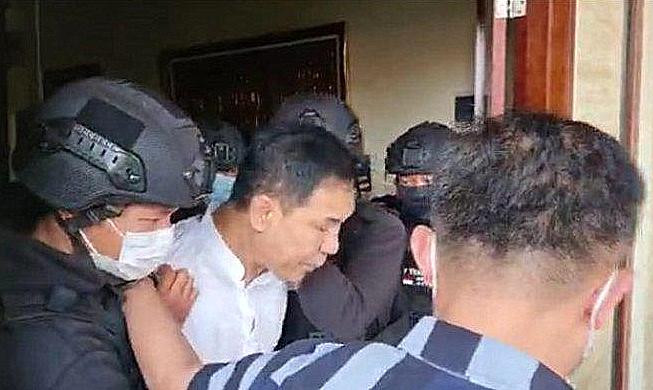Popular Reads
Top Results
Can't find what you're looking for?
View all search resultsPopular Reads
Top Results
Can't find what you're looking for?
View all search resultsThwarting future attacks by FPI splinter cells
The government needs to ensure transparent legal processes in prosecuting all acts of terrorism including those by former FPI members such as Husein’s cell.
Change text size
Gift Premium Articles
to Anyone
E
arlier this month, the police arrested a splinter cell of Islam Defenders Front (FPI) consisting 14 members for planning to attack government and private businesses using 3.5 kilograms of TATP explosives.
A study by the Centre for Radicalism and Deradicalization Studies (Pakar) uncovered three contributing factors that led to the creation of this splinter cell: internal conflict, grievance and inaction.
This FPI splinter cell was formed out of an internal conflict between two FPI leaders, Husein Hasni and Muhsin bin Zeid Alatas. Respectively, they were the deputy head of jihad department of FPI in Jakarta and the leader of FPI in Jakarta.
Conflict arose when Husein protested against Muhsin for illegally occupying Tengku Murdiansyah’s land for Muhsin’s center of religious activities. As Tengku Murdiansyah’s college friend, Husein reminded Muhsin that Muhsin had no right to do so. Consequently, Husein was expelled from FPI without prior consultations regarding his position, with Husein claiming that he has yet to receive any termination letter from other FPI leaders.
FPI spokesman, Munarman, is seemingly covering up this conflict by publicly stating that Husein’s expulsion was due to Husein’s suspected link to the State Intelligence Agency. This chain of events ultimately resulted in the formation of a splinter cell led by Husein.
On Dec. 12, 2020 the police arrested FPI leader, Muhammad Rizieq Shihab, for violating COVID-19 health protocols by holding sermons and rallies with thousands of participants after returning from exile in Saudi Arabia on Nov. 14.
The arrest angered HRS’ supporters including Husein. They protested the arrest and demanded the release of Rizieq by the government in the 1812 mass rally held in front of the Presidential Palace on Dec. 18. When the government rejected their request, Husein and nine other Jakarta FPI members decided to pursue the matter independently.
To punish the government, they planned to attack police, a state-run gas company (PT PGN) and its natural gas pipelines in Sukabumi, and Wayang Windu geothermal plant in Pangalengan, West Java. These attacks were intended to deter foreign investors to Indonesia. They also planned to attack stores and gas stations owned by Chinese Indonesians as they believed the Chinese Indonesians were to be blamed for creating economic inequality in Indonesia.
Additionally, they planned to attack the Aqua beverage factory in Sukabumi, West Java for its link to Danone, a France-based multinational company in retaliation of French President Emmanuel Macron’s alleged insult of Islam.
Husein’s cell decided to pursue terrorism to channel their anger and hatred against their enemies, particularly when the central leadership of FPI was silent about the perceived unfair treatment of Rizieq by the government.
Husein’s cell was not the only one tired of waiting for instructions to attack from FPI central. Another FPI cell in Bandung immediately joined forces when invited by Husein and submitted to his leadership. This Bandung cell was led by Nabil Al Jufri, Husein’s friend. Husein’s cell, thus, increased to 14 including Husein. Sharing their resources, Husein provided a bomb expert and TATP explosives, while Nabil amassed a team of operatives called the silent team led by Asep Komara.
Husein’s cell was eventually dismantled after its members’ arrests. The police were well aware that Husein and his men had assembled TATP explosives in his house in Condet, East Jakarta. This was due to the police closely monitoring FPI members since Rizieq’s arrival in Indonesia. Husein’s cell was, thus, heavily monitored while evidence of their planned attacks were collected. By April 1, 2021 Husein and his men were arrested before they could launch any attacks.
Though the government has banned FPI, its tens of thousands of members remain active in campaigning for the implementation of Islamic law, espousing intolerance and hatred against the government.
As demonstrated by the two splinter cells, their members’ grievances against the government could drive them to separate from the larger FPI community, forming terrorist cells. To prevent this, by working with society leaders, the police need to approach splintering members and persuade them not to take any violent actions against their perceived enemies. This proved successful in preventing FPI members from following Husein’s path of violence.
On Feb. 3, 2021 Husein and Nabil visited the head of the moral police of Bandung FPI, Budi, to garner his support for their attack plans. Husein encouraged Budi to take action against the police but was declined. Budi then shared that previously on Dec. 18, 2020, the police had approached him personally and requested him to not to participate in any protest against Rizieq’ arrest that was to be held in Jakarta.
Both the government and society leaders do not necessarily need to use ideological counternarrative to steer FPI members away from terrorism. Listening to their concerns and providing them with accurate information on the issue is sufficient at stopping their progression toward terrorism. This approach was successful as their hatred for the government and their intolerance toward non-Muslims or political opponents were not on the same level as those of al-Qaeda or Islamic State (IS) supporters.
Additionally, their ideologies differ from that of these terrorist groups. For instance, FPI members still practiced a ritual deemed to be heretic by both terrorist groups’ supporters. This is also evident in the link between Husein and a Muslim shaman in Sukabumi, West Java, Ahmad Dimyati aka Abah Popon. Husein and his men allegedly received superpower abilities from Abah Popon, who made them immune to sharp weapons and hydrochloric acid.
However, once members have left FPI completely and join either pro-al-Qaeda or IS communities, it becomes imperative for the government and society leaders to use ideological counternarratives to debunk their misinterpretation of Islam.
The government needs to ensure transparent legal processes in prosecuting all acts of terrorism including those by former FPI members such as Husein’s cell. This is to avoid prejudice from the public. Notably, antigovernment groups have portrayed the arrest of these members as fabrication, diverting attention from corruption, and the government's ambition to criminalize FPI.
Upon successful conviction, these former FPI members must be severely punished as a deterrence to prevent others from pursuing violence.
It is also pertinent for the government and civil society groups to increase efforts to identify disgruntled FPI members and to persuade them away from terrorism. Without such measures, Indonesia risks these members forming new terrorist cells or joining existing terrorist groups to seek violent redress against the government.
This is evident when in 2008-2017, 37 FPI members split from the group and joined various terrorist groups, including Jamaah Islamiyah, Jamaah Ansharut Tauhid, the al-Qaeda group in Aceh, Jamaah Ansharud Daulah and East Indonesia Mujahidin.
***
Mohd Adhe Bhakti is the executive director of the Centre for Radicalism and Deradicalization Studies (Pakar). Pribadi Sutiono is a terrorism observer and PhD graduate from Victoria University of Wellington, New Zealand. The original article was published in Stratsea.










